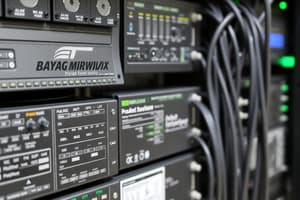Podcast
Questions and Answers
What is a computer system comprised of?
What is a computer system comprised of?
Hardware and software components
Which of the following is not a characteristic of a desktop computer?
Which of the following is not a characteristic of a desktop computer?
- Easy to repair
- Wide range of screen sizes
- Portable (correct)
- Designed for one location
Desktops and laptops are two types of personal computers.
Desktops and laptops are two types of personal computers.
True (A)
What does the term 'form factor' refer to in the context of computer cases?
What does the term 'form factor' refer to in the context of computer cases?
Which power supply unit form factor is the most common on the market today?
Which power supply unit form factor is the most common on the market today?
What is the purpose of a power supply in a computer?
What is the purpose of a power supply in a computer?
Which of the following is a type of laptop?
Which of the following is a type of laptop?
Flashcards are hidden until you start studying
Study Notes
Computer Systems
- A computer system is made up of physical hardware and software.
- Hardware consists of physical components like the case, storage drives, keyboards, monitors, cables, speakers, and printers.
- Software refers to the Operating System and programs, which tell the computer how to operate and perform various functions.
- Personal computers are designed for single users at a time, including desktops and laptops.
Desktops
- A desktop computer is a physical unit with a monitor, CPU, keyboard, and mouse.
- Designed for regular use in a single location.
- Requires a main power supply and is not portable.
- Offers a wide range of screen sizes.
- Can have multiple internal drives.
- Generally larger in size than laptops.
- Easier to repair than laptops.
Laptops
- Laptops are portable computers with full operating systems including Microsoft Windows, iOS, or Linux.
- Offer similar computing power and memory to desktops.
- Integrate screens, keyboards, and touchpads into a portable device.
- Powered by internal batteries or electrical outlets.
- Provide connectivity options such as wired or wireless Ethernet and Bluetooth.
- Offer device connection options like USB and HDMI.
- May have fewer expansion capabilities than desktops.
- May require additional hardware like docks or port replicators to connect peripherals.
Cases and Power Supplies
- Cases are also known as computer chassis.
- They house internal components like the power supply, motherboard, CPU, memory, disk drives, and adapter cards.
- Form factor refers to the physical design of a case.
- Common desktop cases include Tower, SFF (Small Form Factor), Slim Line, Desktop, and All-in-one.
Power Supply Unit (PSU)
- Converts AC power into lower voltage DC power for internal components.
- Desktop PSU form factors include:
- AT (Advanced Technology) – Original PSU for legacy computer systems, now considered obsolete.
- ATX (AT Extended) – Updated version of AT, also obsolete.
- ATX12V – Most common PSU today, providing dedicated power to the CPU via a second motherboard connector.
- EPS12V – Originally designed for network servers, but now used in high-end desktops.
Studying That Suits You
Use AI to generate personalized quizzes and flashcards to suit your learning preferences.




